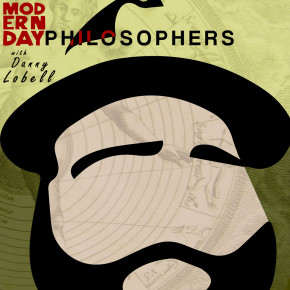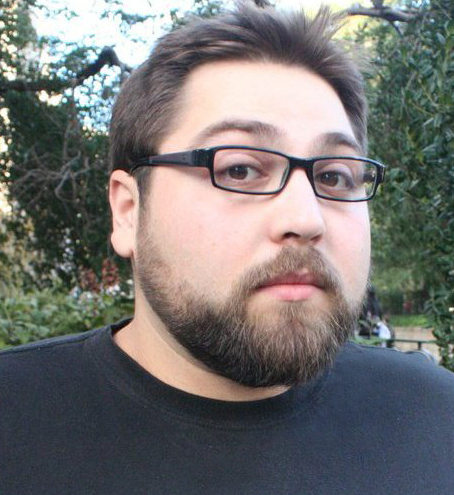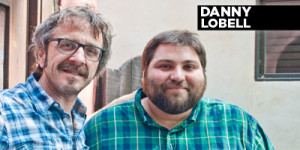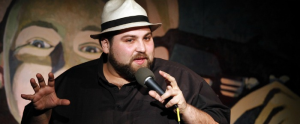Danny Lobell is your typical Scottish/Jewish/Orthodox-raised Los Angeles comedian. Meaning he’s popular in Glasgow, he discovered the world of stand-up through Seinfeld, and ended up at his first open mic by accident on his way home from a trip picking up a new shipment of laser pointers in the shape of women’s breasts. Today, his comedy album, “Some Kind of Comedian,” is coming out on vinyl, and he is launching a new podcast. We sat down with Danny to discuss his upcoming projects, his Seinfeld confusion, and his revenge fantasies for performing in Madrid.
****
Why did you get into comedy?
When I was a kid, I wasn’t aware there was such a thing as stand-up comedy, because I was raised is an Orthodox home. It just wasn’t on my radar. But I did get comedy movies. As a kid, I idealized Jim Carey. I wanted to be a comedy movie star, but I wasn’t familiar with the idea of being a comedian as profession. I just thought there were different kinds of movie stars; serious ones, comedy ones; so I wanted to be a comedy one, like Jim Carey. It wasn’t until Seinfeld came along and my grandma turned me onto it, and I basically thought that Jerry Seinfeld had pioneered a new art form. I really did, I had some vague concept that Jackie Mason was a Jewish comedian, I didn’t know what that meant. But I saw this Seinfeld show, and I was like, “This is pretty cool, I like what this guy is doing, I want to be part of this new thing.”
I wound up doing an open mic at Starbucks. I didn’t even know there was such a thing as an open mic, but I happened to get stuck in the rain coming back from a trip to Manhattan, where I was buying these titty lighters, which were like a woman’s torso, and you’d press down on one tit and fire shoots out of the nipple of the other one, and laser pointers at the wholesale market. And I was selling them on the boardwalk, because I didn’t have an allowance so I always had to be creative with how I made money as a kid. So I was fifteen at the time, about to turn sixteen, and I’d come back from one of my big trips into the city to buy a box. It started pouring rain, and I ran into Starbucks, I was walking home, and the Starbucks was right there. There was an open mic going on. I was like, “What’s this?” I put my name down, it gets to the guy before me and they’re looking for whoever’s next. The guy comes looking for me, “Hey kid, you’re next. What do you . . . do you have an instrument?” I go, “Oh no, I’m not a musician.” “You’re not a musician? Are you a poet?” And I go, “No.” They’re like, “This is a poet and musician open mic, what are you planning on doing?” I go, “Um, I dunno, I just wanted -” They’re like, “You just wanted to go on the mic?” I’m like, “Yeah.” They’re like, “Well we can’t just put you on the mic, you have to do something.” I’m like” I have a funny story that happened on the beach last week, I could tell that.” The guy’s like “Ughhh, alright. I gotta move you, I’m gonna put you last, if you wanna try that at the end.” So it’s like a few hours later in the Starbucks, I’m waiting, the blenders are going off. And I went up, and a few people are left, and I did this story about the beach, and I got some laughs, and I was hooked. And I’m like, “Oh this was great, I wanna do another one,” and they’re like, “Okay, uh, every Wednesday, come by.” So I did that, and I started to write jokes. But I wrote them in the formula of Seinfeld’s jokes, because I thought that that was the offical way that the art was done. I didn’t realize it was a stylistic choice, I thought it was the only way to do it. So if I wrote a joke, it would be like, “Why do they call them convience stores? What’s so convienet about them?” And it didn’t even feel like me when I was doing it. So I’d mix it up. I’d either tell a story, which really felt like me, or I would do this thing that I thought was the only way to do stand-up comedy. They were all written in the style of Jerry Seinfeld.
Also around this time, my parents were like, “The comedy thing you’re doing, you know, they’re doing this contest, in The Jewish Week, they have this this, the Funniest Jewish Comedian Contest at Stand Up New York.” So I was so thrilled, because I was finally going to get to meet the other comedian, Jerry Seinfeld. I was like, “Oh, it’ll be me and him!” He was going to meet me, and be like, “Oh we got another one? It’s catching on? Oh, cool!” So I headed over to Stand Up New York, at the time I was also playing guitar, and I had this whole thing I’d do, I’d be like, these are stand-up jokes, and then I’d have story, and then I’d have a funny songs that I would write.
So I head up to Stand Up NY. I’m looking around for Seinfeld, I wanted to introduce myself. Of course, there was no Seinfeld there, it was just a bunch of people from different synagogues reading jokes off of note cards. And I came in third place I think. I was also intrigued because it was the first time I’d ever been to a comedy club. I was so amazed.
I did another Funniest Jewish Comedian’s contest when I was seventeen. When I was eighteen I went to Young Judea’s year abroad in Israel. I still hadn’t gotten it in my head that I wanted to be a comedian. I just thought this was amongst the things I wanted to do, it’s not the thing. It wasn’t until I got back and started up at college, a few months into it someone was selling tickets to the New York Comedy Club on the street, and I bought them and went to watch a show, and I was telling people, “Oh I used to do this kind of thing.” And I was like, “What am I talking about? I still want to do this.” And on the way out I had mentioned to the manager of the club, “I used to do this. I went away for a year, but I used to do this.” He goes, “Well, you wanna come do it again?” I thought he could just tell I was funny, like he had just booked me on the spot. I didn’t realize I’d been roped into a bringer show. But of course I brought them, and I was so excited, too. I had still relatively no concept of how vast or big the comedy world was. And so that began a lot of bringer shows that I wound up doing, until I ran out of friends who wanted to come, and I had to hand out flyers for five years for stage time. So many more things transpired from there, a magazine, lots of radio stuff, I started up a podcast.
So being in the Orthodox world, you didn’t have much context for stand-up? Did any of your friends know about the comedy world?
I had gotten the Adam Sandler C.D. He was on my radar early on, from the movies. I still hadn’t put it together that he was a comedian. We heard that in Yeshiva, all the kids had that one. All Jewish kids in Yeshiva, we were obsessed with The Beastie boys and Adam Sandler. Because the Beastie Boys, they’d been to Yeshiva, and Adam Sandler was just so Jewish. They were just like Jewish heroes, you know? And then somehow Green Day, too, but I think that was just a product of the time. That’s just like the culture that seeped into the Yeshiva.
Your voice work is great. Was that always part of your routine?
That’s just something I’ve done since I was a kid. I just did them. I’m sure that a lot of it was Jim Carey inspired. My oldest friend in the world, we went to play group together as one year olds. And we both came from Flushing Queens, and my family moved to Longbeach, Long Island, and then his family came to visit us, and they liked it and they moved down the block from us. Him and I have been really tight since before consciousness kicked in. I remember him telling me in the second grade something that stuck with me until now. We’re at recess, and he goes, “Dan, what’s your real voice sound like?” And I go, “What do you mean?” He’s like,” Oh, you just do so many voices, I don’t know which one was your real voice. And I looked at him like, “What are you talking about?” But he was dead serious. And I got really self-conscious about it at that point, and I think I scaled back on doing so many voices. That was even before Jim Carrey. But I think maybe Jim Carrey made it acceptable in my head to bring it all back. Him and Robin Williams; I had no concept that these guys did stand-up comedy.
I’d love to get on a sketch show or do that kind of thing, but unfortunately it’s always been secondary for me because I’ve got to make a living and I love doing stand-up so that is always my priority. But getting to do these characters and voices, I love flexing that muscle. It’s just so much fun. I constantly try to grow that part of my comedic spectrum.
So you do some storytelling. What do you feel you get out of that art form that you don’t get out of straight stand-up?
It really goes back to originally at my core, I am a storyteller. The first thing I ever did on stage was a story, a funny story. The only reason I probably even ever started writing jokes was because I thought you had to. (That Seinfeld thing.) And then I worked really hard at becoming a joke writer in my own style. You know, I’ve heard people say that you always ultimately go back to what’s originally naturally and organically you. So many comic stand-ups do their first few shows, and it’s really them, and then they gravitate to these different things they feel that they have to or are supposed to do, and then ultimately they come back to who they are. And I feel like that’s kind of what storytelling’s been for me.
But I think it all happened for a reason on some level. Because had I not thought I had to be a joke writer, I probably never would’ve, and I would’ve just been a storyteller. But because I forced myself to be a joke writer, because I went to New York Comedy Club where they’d make fun of you, it was the opposite of alternative comedy where it would’ve been supportive. I used to do stuff on stage that I guess would be called “alternative comedy” and I would get ripped apart by the comics afterwards, to the point where I was afraid to do it, and I thought it was wrong. I never got into the alt scene when it was happening. I think I was just completely like, “Stay focused on one place. Don’t spread yourself too thin.” Which was a mistake probably, but maybe not, because what I’m saying is, I had to become a great joke writer, just to keep up with that vicious atmosphere of “This is comedy, this is how it’s done.” And now as a storyteller, I’m really able to sort of merge the two, and sort of plant little jokes into the stories. And I’m having a lot of fun with that.
In 2009, you created a webseries based on your radio show, “Rise of the Radio Show.” Any plans to do another webseries in the future? Any interest in doing another radio show?
Yes to all of those things. I’m currently writing two different webseries. one with my girlfriend who’s an amazing writer, and one with this young comic who has this great writing ability, his name is Alex Fossella. It’s about people who are greeters at Walmart. And we still need to get funding for it . . . so, JEWS OUT THERE, COME ON! Help us make this! And the other one I’m writing with my girlfriend is about freelancing.
I have a new podcast that I’m starting up, with is basically just me learning philosophy with different comedians. I never took college seriously, and I regret that I never really took philosophy seriously, because I obviously am drawn to it. And then I started thinking about how comedians are basically modern day philosophers, at their best. And then I started learning philosophy on my own, which has been really fun, but it’s a lonely pursuit just sitting there reading philosophy by myself. And my girlfriend is like, “It’s the middle of the day, you need to be working on stuff, and working on your career . . . this is what college was supposed to be for.” I was like, “Well maybe I could make it part of my career.”
I also produce Ralhpie May and Lahna Turner’s’s podcast, “Perfect 10.”
Which are more neurotic, American Jews or Scottish Jews?
Oh Scottish Jews for sure. For sure. Because it’s a European mentality out there, and Europe is much less Jew-friendly.
Have any good heckler stories?
I hate even giving hecklers any kind of press. There’s a part of me, I just don’t even want to answer, because I don’t want to tell anyone about a good heckle, ‘cause then someone else in their head is gonna be like, “Oh I wanna make a good heckling article one day.” It’s like, no, I don’t wanna promote that at all. Yes there have been times that I’ve been heckled and it’s been interesting, but I would rather it never happened. It’s like any kind of performance art; I don’t want to glorify somebody who is trying to detract from somebody who is trying to create.
 Who’s better: Hot Jewish Chicks, or Shiksas?
Who’s better: Hot Jewish Chicks, or Shiksas?
I have to say that beautiful women are beautiful regardless of faith or generic origin. I have met many beautiful Jewish women who have blown me away. I’m currently dating a non Jew who is in the process of converting to Judaism which will ultimately put her in both categories. So my answer is it all depends on the girl.
What do you have coming up next?
We’re gonna do a limited run of the C.D. on vinyl. I’m writing a book right now with another comedian who’s awesome and Jewish also, Myq Kaplan. We’re writing a book which should hopefully be in like Urban Outfitters type of places. I just completed my first feature film script, so I’m shopping that around. Like I said, I’m working on those two webseries and that podcast. Touring around LA mostly, just doing shows.
I’m hopefully going to go back to Spain. I did a bunch of show in Spain two years ago; Madrid and Barcelona, and it was just phenomenal. I thought it was only going to be ex-pats, or like, English-speaking people that lived there. But a lot of Spanish people came that speak English. It was pretty cool, I had such a great time. I have so much pride getting paid to come back to Madrid, because my family were forced out of there during the Inquisition. And I think it’s such a “fuck you” to history that they would bring this big Jew back, and pay him to come back to Madrid. It just fuels me. That’s that Jewish rage, like, “Revenge! The Jew is coming, and he’s going to talk about being a Jew, back in the very city where you exiled him from so many years ago!”
*****
Danny’s new podcast, “Modern Day Philosophers” will feature comedians like Rick Overton, TJ Miller, Fred Stoller and Ralphie May. Danny’s first guest is U.K. comedian Matt Kirshen. Check it out here!
Danny will be opening for Ralphie May at Hollywood Improv on August 20. For tickets and info, visit here.
To catch Danny on tour or see his videos, visit dannylobell.com.






Leave a Reply